Franchise Business Management: Advantages and Disadvantages Analysis
VerifiedAdded on 2022/04/18
|6
|1951
|38
Report
AI Summary
This report, prepared for ECB30303 Franchise Business Management, analyzes the advantages and disadvantages of the franchise business model from the franchisor's perspective. It explores how franchising facilitates business expansion with minimal capital and reduced risk, enhances brand awareness, and provides access to capital through franchise fees. The report also addresses potential drawbacks, including the loss of brand management control, challenges in franchisee recruitment and communication, and the potential for stifled creativity due to uniformity requirements. It emphasizes the importance of balancing these factors when considering franchising as a growth strategy and highlights the role of franchise agreements and regulatory compliance. The report concludes by referencing several sources that provide further insights into the franchise business model, offering a comprehensive overview of the topic.
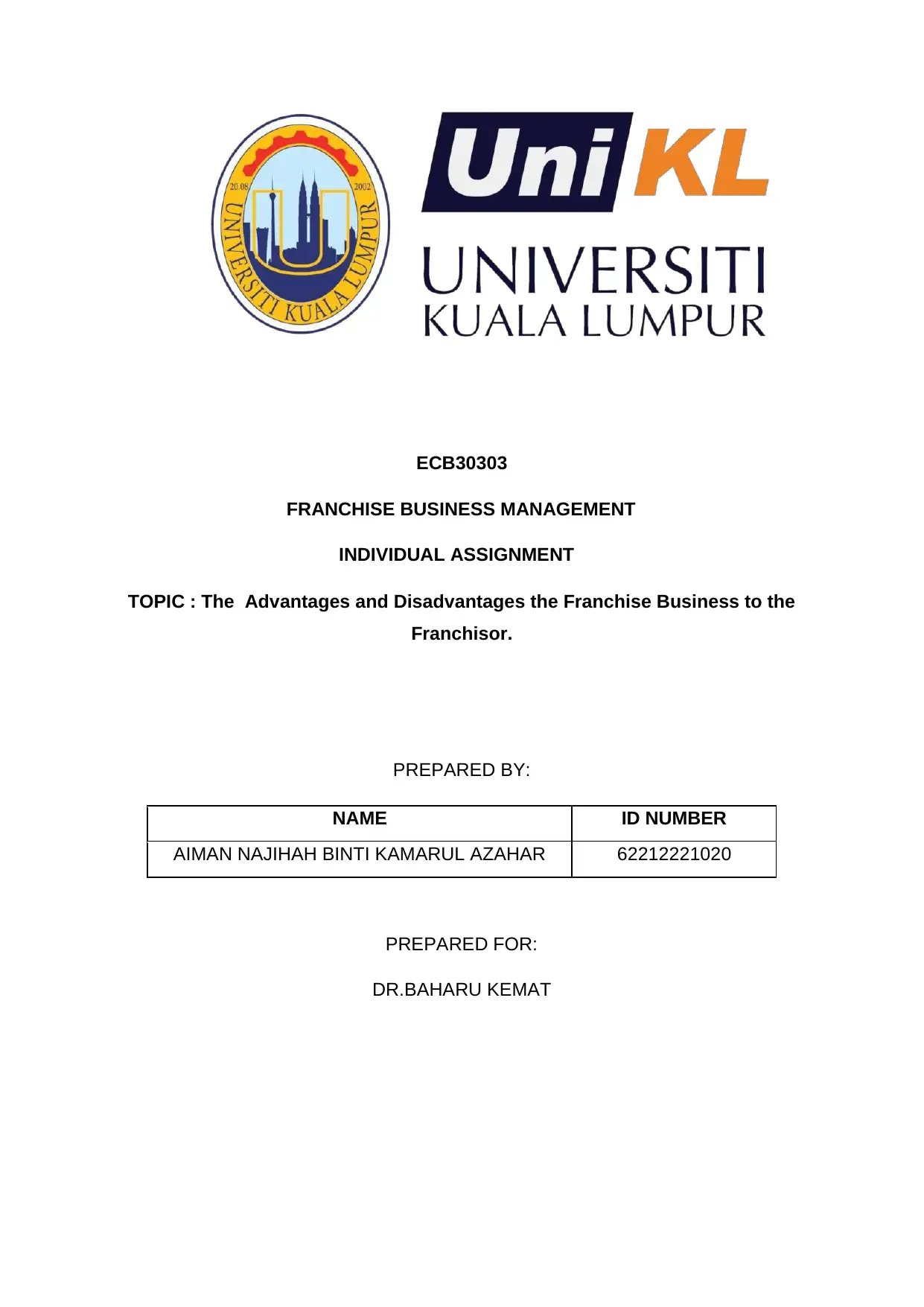
ECB30303
FRANCHISE BUSINESS MANAGEMENT
INDIVIDUAL ASSIGNMENT
TOPIC : The Advantages and Disadvantages the Franchise Business to the
Franchisor.
PREPARED BY:
NAME ID NUMBER
AIMAN NAJIHAH BINTI KAMARUL AZAHAR 62212221020
PREPARED FOR:
DR.BAHARU KEMAT
FRANCHISE BUSINESS MANAGEMENT
INDIVIDUAL ASSIGNMENT
TOPIC : The Advantages and Disadvantages the Franchise Business to the
Franchisor.
PREPARED BY:
NAME ID NUMBER
AIMAN NAJIHAH BINTI KAMARUL AZAHAR 62212221020
PREPARED FOR:
DR.BAHARU KEMAT
Paraphrase This Document
Need a fresh take? Get an instant paraphrase of this document with our AI Paraphraser
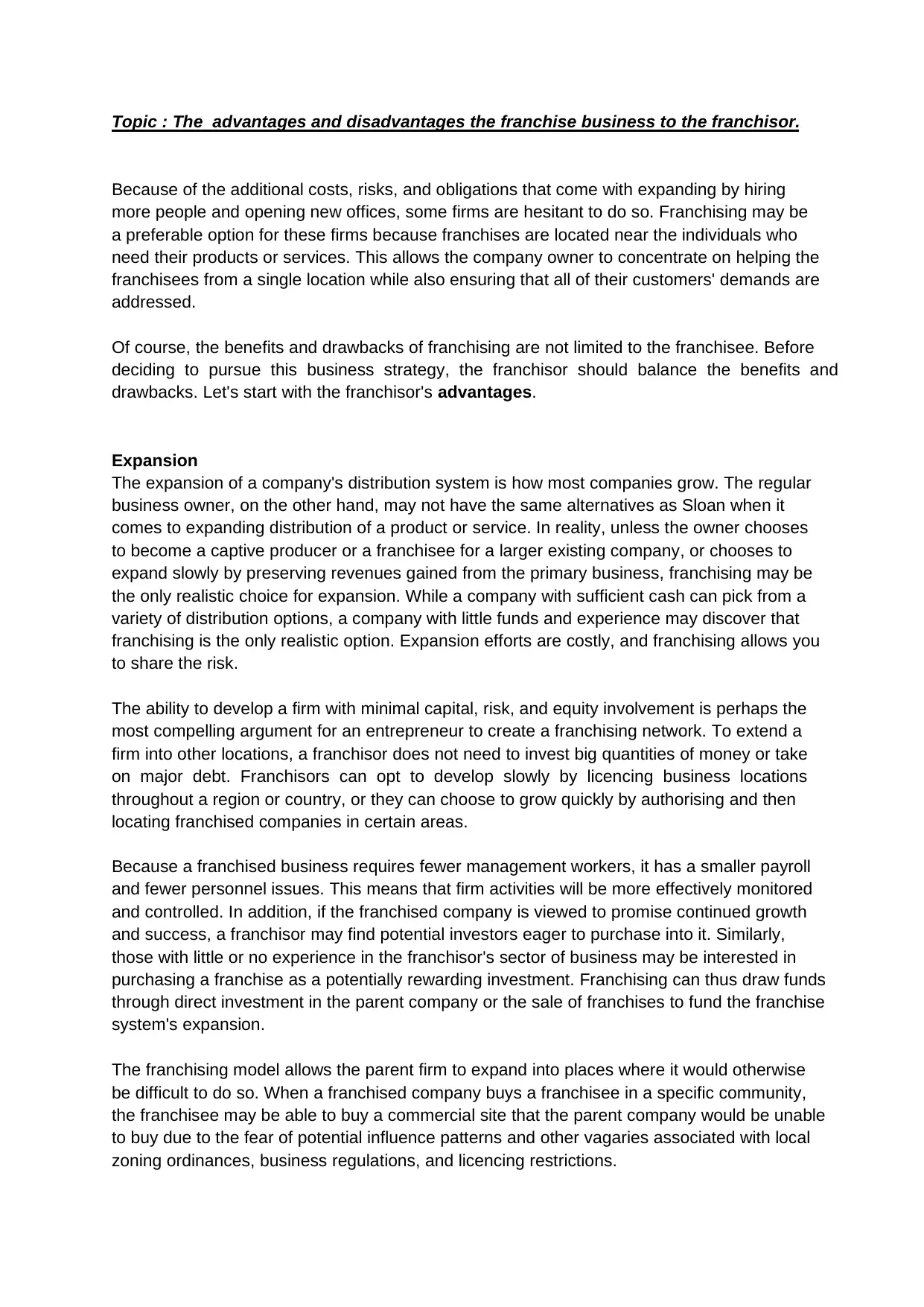
Topic : The advantages and disadvantages the franchise business to the franchisor.
Because of the additional costs, risks, and obligations that come with expanding by hiring
more people and opening new offices, some firms are hesitant to do so. Franchising may be
a preferable option for these firms because franchises are located near the individuals who
need their products or services. This allows the company owner to concentrate on helping the
franchisees from a single location while also ensuring that all of their customers' demands are
addressed.
Of course, the benefits and drawbacks of franchising are not limited to the franchisee. Before
deciding to pursue this business strategy, the franchisor should balance the benefits and
drawbacks. Let's start with the franchisor's advantages.
Expansion
The expansion of a company's distribution system is how most companies grow. The regular
business owner, on the other hand, may not have the same alternatives as Sloan when it
comes to expanding distribution of a product or service. In reality, unless the owner chooses
to become a captive producer or a franchisee for a larger existing company, or chooses to
expand slowly by preserving revenues gained from the primary business, franchising may be
the only realistic choice for expansion. While a company with sufficient cash can pick from a
variety of distribution options, a company with little funds and experience may discover that
franchising is the only realistic option. Expansion efforts are costly, and franchising allows you
to share the risk.
The ability to develop a firm with minimal capital, risk, and equity involvement is perhaps the
most compelling argument for an entrepreneur to create a franchising network. To extend a
firm into other locations, a franchisor does not need to invest big quantities of money or take
on major debt. Franchisors can opt to develop slowly by licencing business locations
throughout a region or country, or they can choose to grow quickly by authorising and then
locating franchised companies in certain areas.
Because a franchised business requires fewer management workers, it has a smaller payroll
and fewer personnel issues. This means that firm activities will be more effectively monitored
and controlled. In addition, if the franchised company is viewed to promise continued growth
and success, a franchisor may find potential investors eager to purchase into it. Similarly,
those with little or no experience in the franchisor's sector of business may be interested in
purchasing a franchise as a potentially rewarding investment. Franchising can thus draw funds
through direct investment in the parent company or the sale of franchises to fund the franchise
system's expansion.
The franchising model allows the parent firm to expand into places where it would otherwise
be difficult to do so. When a franchised company buys a franchisee in a specific community,
the franchisee may be able to buy a commercial site that the parent company would be unable
to buy due to the fear of potential influence patterns and other vagaries associated with local
zoning ordinances, business regulations, and licencing restrictions.
Because of the additional costs, risks, and obligations that come with expanding by hiring
more people and opening new offices, some firms are hesitant to do so. Franchising may be
a preferable option for these firms because franchises are located near the individuals who
need their products or services. This allows the company owner to concentrate on helping the
franchisees from a single location while also ensuring that all of their customers' demands are
addressed.
Of course, the benefits and drawbacks of franchising are not limited to the franchisee. Before
deciding to pursue this business strategy, the franchisor should balance the benefits and
drawbacks. Let's start with the franchisor's advantages.
Expansion
The expansion of a company's distribution system is how most companies grow. The regular
business owner, on the other hand, may not have the same alternatives as Sloan when it
comes to expanding distribution of a product or service. In reality, unless the owner chooses
to become a captive producer or a franchisee for a larger existing company, or chooses to
expand slowly by preserving revenues gained from the primary business, franchising may be
the only realistic choice for expansion. While a company with sufficient cash can pick from a
variety of distribution options, a company with little funds and experience may discover that
franchising is the only realistic option. Expansion efforts are costly, and franchising allows you
to share the risk.
The ability to develop a firm with minimal capital, risk, and equity involvement is perhaps the
most compelling argument for an entrepreneur to create a franchising network. To extend a
firm into other locations, a franchisor does not need to invest big quantities of money or take
on major debt. Franchisors can opt to develop slowly by licencing business locations
throughout a region or country, or they can choose to grow quickly by authorising and then
locating franchised companies in certain areas.
Because a franchised business requires fewer management workers, it has a smaller payroll
and fewer personnel issues. This means that firm activities will be more effectively monitored
and controlled. In addition, if the franchised company is viewed to promise continued growth
and success, a franchisor may find potential investors eager to purchase into it. Similarly,
those with little or no experience in the franchisor's sector of business may be interested in
purchasing a franchise as a potentially rewarding investment. Franchising can thus draw funds
through direct investment in the parent company or the sale of franchises to fund the franchise
system's expansion.
The franchising model allows the parent firm to expand into places where it would otherwise
be difficult to do so. When a franchised company buys a franchisee in a specific community,
the franchisee may be able to buy a commercial site that the parent company would be unable
to buy due to the fear of potential influence patterns and other vagaries associated with local
zoning ordinances, business regulations, and licencing restrictions.
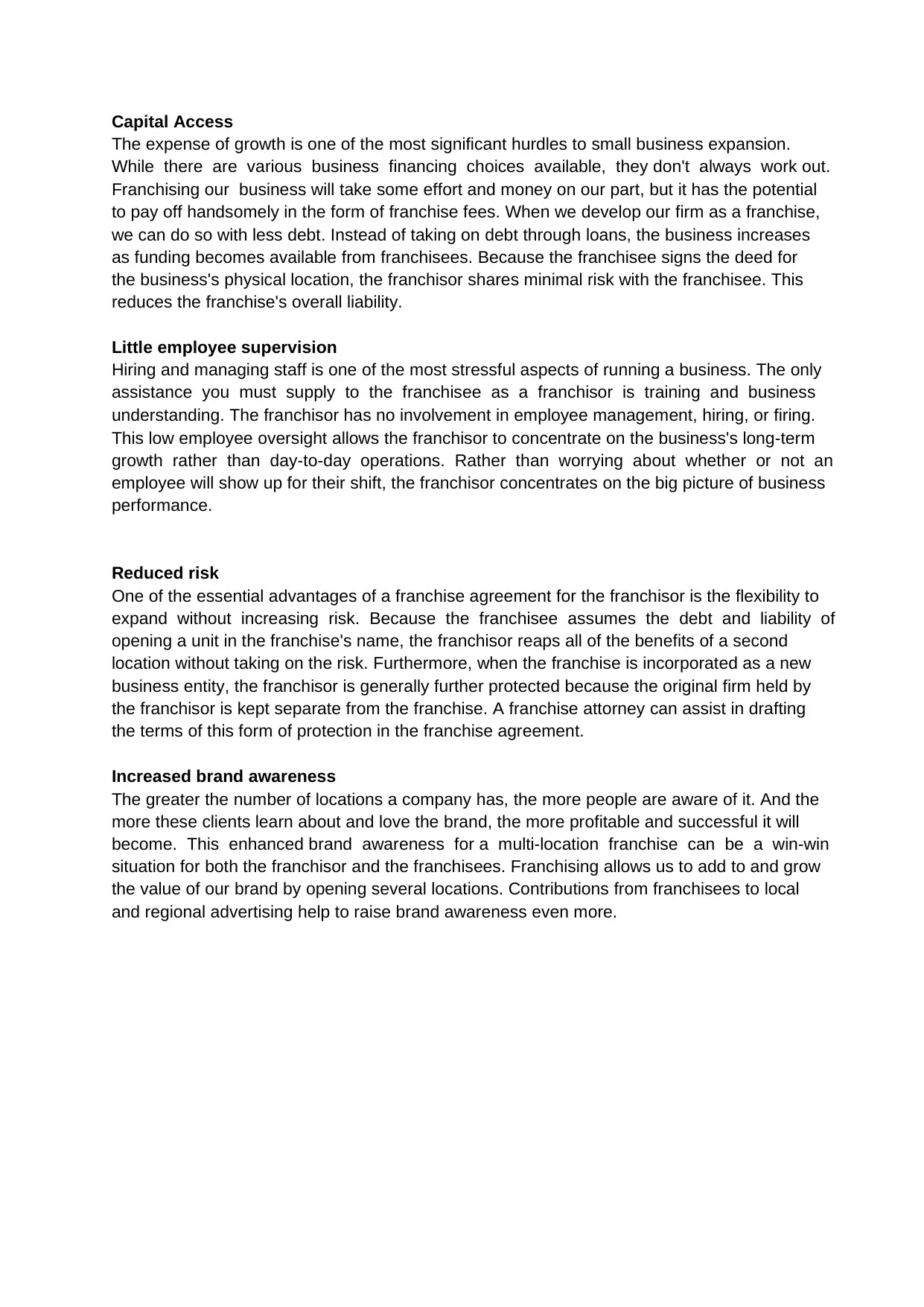
Capital Access
The expense of growth is one of the most significant hurdles to small business expansion.
While there are various business financing choices available, they don't always work out.
Franchising our business will take some effort and money on our part, but it has the potential
to pay off handsomely in the form of franchise fees. When we develop our firm as a franchise,
we can do so with less debt. Instead of taking on debt through loans, the business increases
as funding becomes available from franchisees. Because the franchisee signs the deed for
the business's physical location, the franchisor shares minimal risk with the franchisee. This
reduces the franchise's overall liability.
Little employee supervision
Hiring and managing staff is one of the most stressful aspects of running a business. The only
assistance you must supply to the franchisee as a franchisor is training and business
understanding. The franchisor has no involvement in employee management, hiring, or firing.
This low employee oversight allows the franchisor to concentrate on the business's long-term
growth rather than day-to-day operations. Rather than worrying about whether or not an
employee will show up for their shift, the franchisor concentrates on the big picture of business
performance.
Reduced risk
One of the essential advantages of a franchise agreement for the franchisor is the flexibility to
expand without increasing risk. Because the franchisee assumes the debt and liability of
opening a unit in the franchise's name, the franchisor reaps all of the benefits of a second
location without taking on the risk. Furthermore, when the franchise is incorporated as a new
business entity, the franchisor is generally further protected because the original firm held by
the franchisor is kept separate from the franchise. A franchise attorney can assist in drafting
the terms of this form of protection in the franchise agreement.
Increased brand awareness
The greater the number of locations a company has, the more people are aware of it. And the
more these clients learn about and love the brand, the more profitable and successful it will
become. This enhanced brand awareness for a multi-location franchise can be a win-win
situation for both the franchisor and the franchisees. Franchising allows us to add to and grow
the value of our brand by opening several locations. Contributions from franchisees to local
and regional advertising help to raise brand awareness even more.
The expense of growth is one of the most significant hurdles to small business expansion.
While there are various business financing choices available, they don't always work out.
Franchising our business will take some effort and money on our part, but it has the potential
to pay off handsomely in the form of franchise fees. When we develop our firm as a franchise,
we can do so with less debt. Instead of taking on debt through loans, the business increases
as funding becomes available from franchisees. Because the franchisee signs the deed for
the business's physical location, the franchisor shares minimal risk with the franchisee. This
reduces the franchise's overall liability.
Little employee supervision
Hiring and managing staff is one of the most stressful aspects of running a business. The only
assistance you must supply to the franchisee as a franchisor is training and business
understanding. The franchisor has no involvement in employee management, hiring, or firing.
This low employee oversight allows the franchisor to concentrate on the business's long-term
growth rather than day-to-day operations. Rather than worrying about whether or not an
employee will show up for their shift, the franchisor concentrates on the big picture of business
performance.
Reduced risk
One of the essential advantages of a franchise agreement for the franchisor is the flexibility to
expand without increasing risk. Because the franchisee assumes the debt and liability of
opening a unit in the franchise's name, the franchisor reaps all of the benefits of a second
location without taking on the risk. Furthermore, when the franchise is incorporated as a new
business entity, the franchisor is generally further protected because the original firm held by
the franchisor is kept separate from the franchise. A franchise attorney can assist in drafting
the terms of this form of protection in the franchise agreement.
Increased brand awareness
The greater the number of locations a company has, the more people are aware of it. And the
more these clients learn about and love the brand, the more profitable and successful it will
become. This enhanced brand awareness for a multi-location franchise can be a win-win
situation for both the franchisor and the franchisees. Franchising allows us to add to and grow
the value of our brand by opening several locations. Contributions from franchisees to local
and regional advertising help to raise brand awareness even more.
⊘ This is a preview!⊘
Do you want full access?
Subscribe today to unlock all pages.

Trusted by 1+ million students worldwide
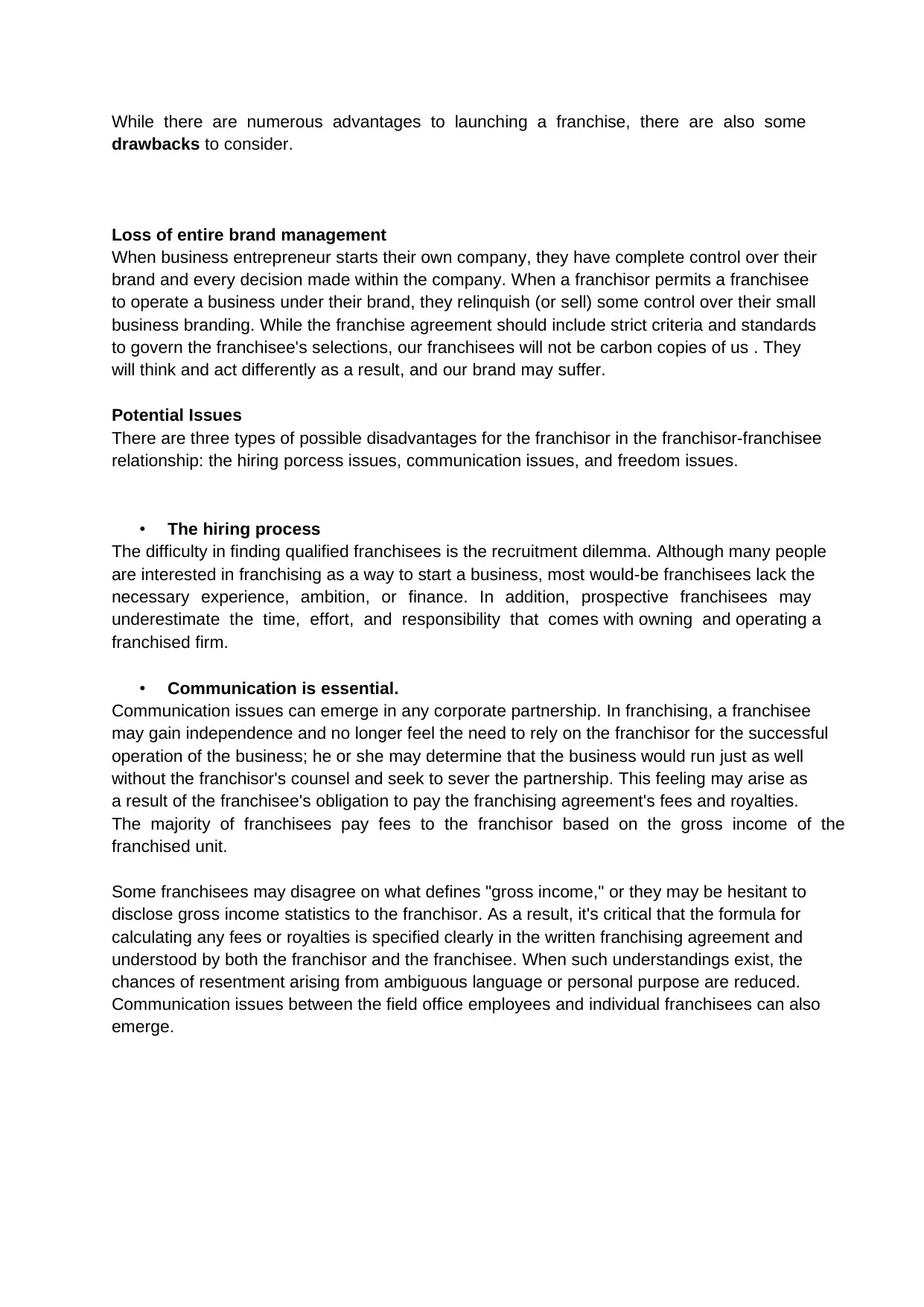
While there are numerous advantages to launching a franchise, there are also some
drawbacks to consider.
Loss of entire brand management
When business entrepreneur starts their own company, they have complete control over their
brand and every decision made within the company. When a franchisor permits a franchisee
to operate a business under their brand, they relinquish (or sell) some control over their small
business branding. While the franchise agreement should include strict criteria and standards
to govern the franchisee's selections, our franchisees will not be carbon copies of us . They
will think and act differently as a result, and our brand may suffer.
Potential Issues
There are three types of possible disadvantages for the franchisor in the franchisor-franchisee
relationship: the hiring porcess issues, communication issues, and freedom issues.
• The hiring process
The difficulty in finding qualified franchisees is the recruitment dilemma. Although many people
are interested in franchising as a way to start a business, most would-be franchisees lack the
necessary experience, ambition, or finance. In addition, prospective franchisees may
underestimate the time, effort, and responsibility that comes with owning and operating a
franchised firm.
• Communication is essential.
Communication issues can emerge in any corporate partnership. In franchising, a franchisee
may gain independence and no longer feel the need to rely on the franchisor for the successful
operation of the business; he or she may determine that the business would run just as well
without the franchisor's counsel and seek to sever the partnership. This feeling may arise as
a result of the franchisee's obligation to pay the franchising agreement's fees and royalties.
The majority of franchisees pay fees to the franchisor based on the gross income of the
franchised unit.
Some franchisees may disagree on what defines "gross income," or they may be hesitant to
disclose gross income statistics to the franchisor. As a result, it's critical that the formula for
calculating any fees or royalties is specified clearly in the written franchising agreement and
understood by both the franchisor and the franchisee. When such understandings exist, the
chances of resentment arising from ambiguous language or personal purpose are reduced.
Communication issues between the field office employees and individual franchisees can also
emerge.
drawbacks to consider.
Loss of entire brand management
When business entrepreneur starts their own company, they have complete control over their
brand and every decision made within the company. When a franchisor permits a franchisee
to operate a business under their brand, they relinquish (or sell) some control over their small
business branding. While the franchise agreement should include strict criteria and standards
to govern the franchisee's selections, our franchisees will not be carbon copies of us . They
will think and act differently as a result, and our brand may suffer.
Potential Issues
There are three types of possible disadvantages for the franchisor in the franchisor-franchisee
relationship: the hiring porcess issues, communication issues, and freedom issues.
• The hiring process
The difficulty in finding qualified franchisees is the recruitment dilemma. Although many people
are interested in franchising as a way to start a business, most would-be franchisees lack the
necessary experience, ambition, or finance. In addition, prospective franchisees may
underestimate the time, effort, and responsibility that comes with owning and operating a
franchised firm.
• Communication is essential.
Communication issues can emerge in any corporate partnership. In franchising, a franchisee
may gain independence and no longer feel the need to rely on the franchisor for the successful
operation of the business; he or she may determine that the business would run just as well
without the franchisor's counsel and seek to sever the partnership. This feeling may arise as
a result of the franchisee's obligation to pay the franchising agreement's fees and royalties.
The majority of franchisees pay fees to the franchisor based on the gross income of the
franchised unit.
Some franchisees may disagree on what defines "gross income," or they may be hesitant to
disclose gross income statistics to the franchisor. As a result, it's critical that the formula for
calculating any fees or royalties is specified clearly in the written franchising agreement and
understood by both the franchisor and the franchisee. When such understandings exist, the
chances of resentment arising from ambiguous language or personal purpose are reduced.
Communication issues between the field office employees and individual franchisees can also
emerge.
Paraphrase This Document
Need a fresh take? Get an instant paraphrase of this document with our AI Paraphraser
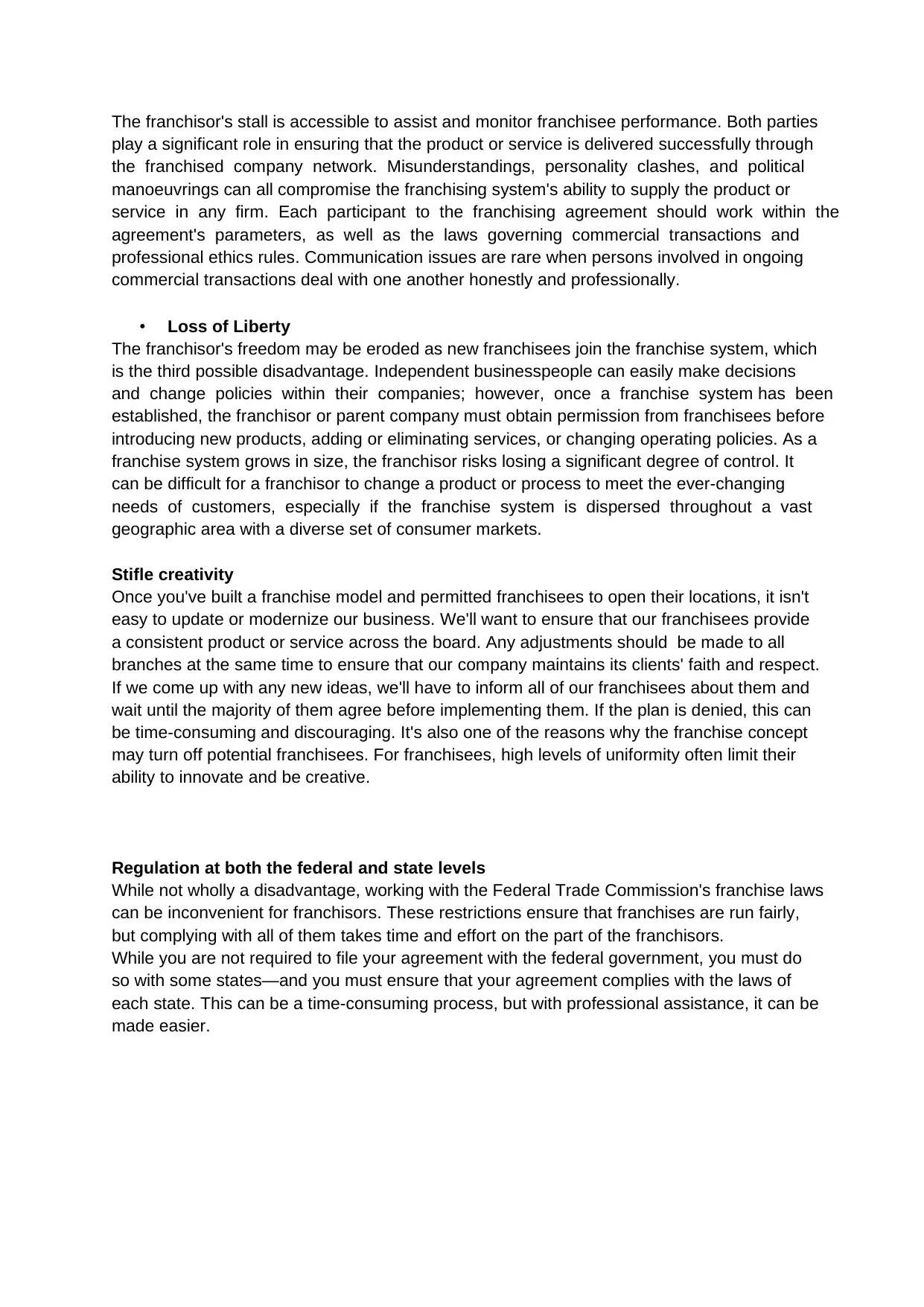
The franchisor's stall is accessible to assist and monitor franchisee performance. Both parties
play a significant role in ensuring that the product or service is delivered successfully through
the franchised company network. Misunderstandings, personality clashes, and political
manoeuvrings can all compromise the franchising system's ability to supply the product or
service in any firm. Each participant to the franchising agreement should work within the
agreement's parameters, as well as the laws governing commercial transactions and
professional ethics rules. Communication issues are rare when persons involved in ongoing
commercial transactions deal with one another honestly and professionally.
• Loss of Liberty
The franchisor's freedom may be eroded as new franchisees join the franchise system, which
is the third possible disadvantage. Independent businesspeople can easily make decisions
and change policies within their companies; however, once a franchise system has been
established, the franchisor or parent company must obtain permission from franchisees before
introducing new products, adding or eliminating services, or changing operating policies. As a
franchise system grows in size, the franchisor risks losing a significant degree of control. It
can be difficult for a franchisor to change a product or process to meet the ever-changing
needs of customers, especially if the franchise system is dispersed throughout a vast
geographic area with a diverse set of consumer markets.
Stifle creativity
Once you've built a franchise model and permitted franchisees to open their locations, it isn't
easy to update or modernize our business. We'll want to ensure that our franchisees provide
a consistent product or service across the board. Any adjustments should be made to all
branches at the same time to ensure that our company maintains its clients' faith and respect.
If we come up with any new ideas, we'll have to inform all of our franchisees about them and
wait until the majority of them agree before implementing them. If the plan is denied, this can
be time-consuming and discouraging. It's also one of the reasons why the franchise concept
may turn off potential franchisees. For franchisees, high levels of uniformity often limit their
ability to innovate and be creative.
Regulation at both the federal and state levels
While not wholly a disadvantage, working with the Federal Trade Commission's franchise laws
can be inconvenient for franchisors. These restrictions ensure that franchises are run fairly,
but complying with all of them takes time and effort on the part of the franchisors.
While you are not required to file your agreement with the federal government, you must do
so with some states—and you must ensure that your agreement complies with the laws of
each state. This can be a time-consuming process, but with professional assistance, it can be
made easier.
play a significant role in ensuring that the product or service is delivered successfully through
the franchised company network. Misunderstandings, personality clashes, and political
manoeuvrings can all compromise the franchising system's ability to supply the product or
service in any firm. Each participant to the franchising agreement should work within the
agreement's parameters, as well as the laws governing commercial transactions and
professional ethics rules. Communication issues are rare when persons involved in ongoing
commercial transactions deal with one another honestly and professionally.
• Loss of Liberty
The franchisor's freedom may be eroded as new franchisees join the franchise system, which
is the third possible disadvantage. Independent businesspeople can easily make decisions
and change policies within their companies; however, once a franchise system has been
established, the franchisor or parent company must obtain permission from franchisees before
introducing new products, adding or eliminating services, or changing operating policies. As a
franchise system grows in size, the franchisor risks losing a significant degree of control. It
can be difficult for a franchisor to change a product or process to meet the ever-changing
needs of customers, especially if the franchise system is dispersed throughout a vast
geographic area with a diverse set of consumer markets.
Stifle creativity
Once you've built a franchise model and permitted franchisees to open their locations, it isn't
easy to update or modernize our business. We'll want to ensure that our franchisees provide
a consistent product or service across the board. Any adjustments should be made to all
branches at the same time to ensure that our company maintains its clients' faith and respect.
If we come up with any new ideas, we'll have to inform all of our franchisees about them and
wait until the majority of them agree before implementing them. If the plan is denied, this can
be time-consuming and discouraging. It's also one of the reasons why the franchise concept
may turn off potential franchisees. For franchisees, high levels of uniformity often limit their
ability to innovate and be creative.
Regulation at both the federal and state levels
While not wholly a disadvantage, working with the Federal Trade Commission's franchise laws
can be inconvenient for franchisors. These restrictions ensure that franchises are run fairly,
but complying with all of them takes time and effort on the part of the franchisors.
While you are not required to file your agreement with the federal government, you must do
so with some states—and you must ensure that your agreement complies with the laws of
each state. This can be a time-consuming process, but with professional assistance, it can be
made easier.
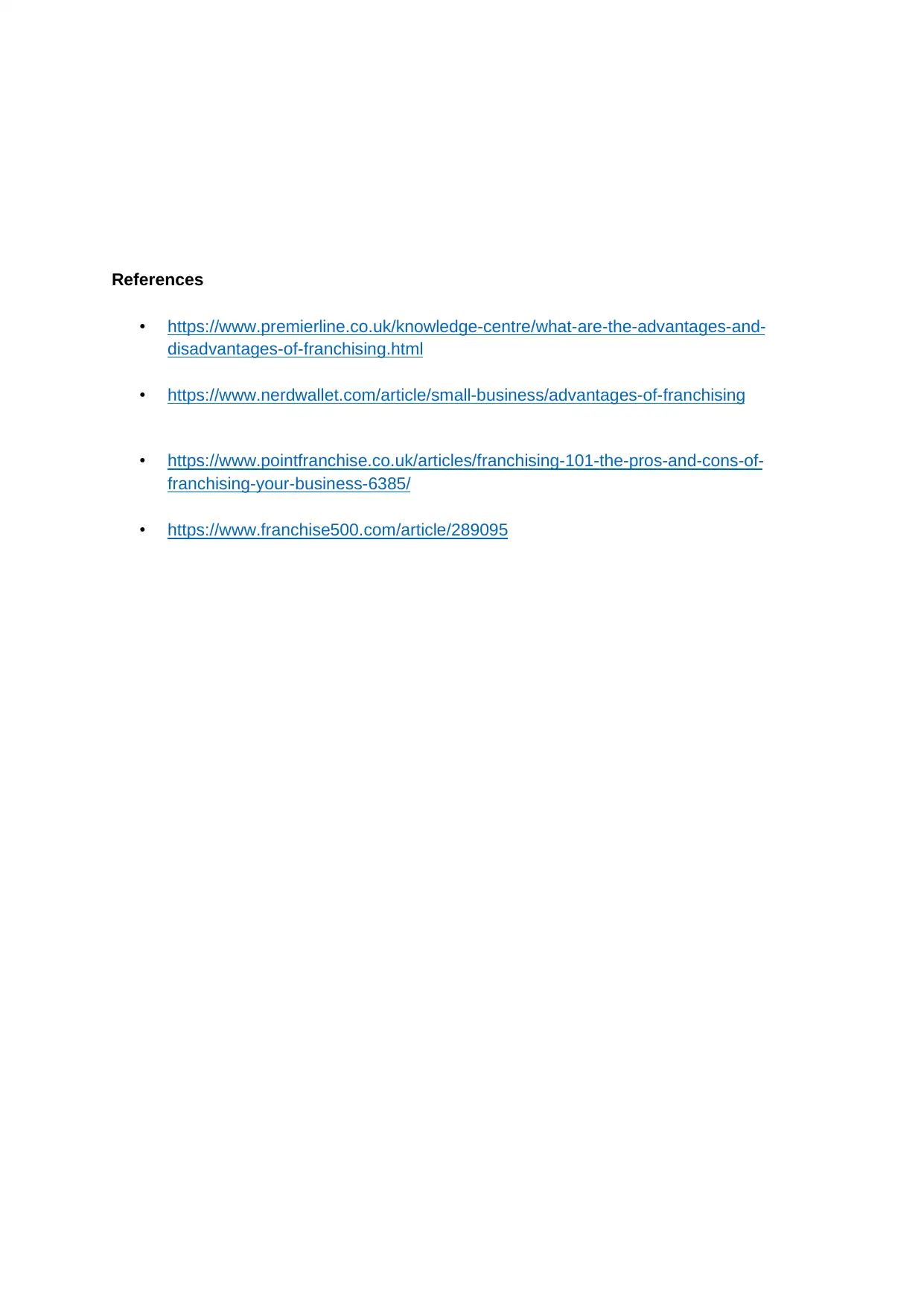
References
• https://www.premierline.co.uk/knowledge-centre/what-are-the-advantages-and-
disadvantages-of-franchising.html
• https://www.nerdwallet.com/article/small-business/advantages-of-franchising
• https://www.pointfranchise.co.uk/articles/franchising-101-the-pros-and-cons-of-
franchising-your-business-6385/
• https://www.franchise500.com/article/289095
• https://www.premierline.co.uk/knowledge-centre/what-are-the-advantages-and-
disadvantages-of-franchising.html
• https://www.nerdwallet.com/article/small-business/advantages-of-franchising
• https://www.pointfranchise.co.uk/articles/franchising-101-the-pros-and-cons-of-
franchising-your-business-6385/
• https://www.franchise500.com/article/289095
⊘ This is a preview!⊘
Do you want full access?
Subscribe today to unlock all pages.

Trusted by 1+ million students worldwide
1 out of 6
Related Documents
Your All-in-One AI-Powered Toolkit for Academic Success.
+13062052269
info@desklib.com
Available 24*7 on WhatsApp / Email
![[object Object]](/_next/static/media/star-bottom.7253800d.svg)
Unlock your academic potential
Copyright © 2020–2026 A2Z Services. All Rights Reserved. Developed and managed by ZUCOL.





